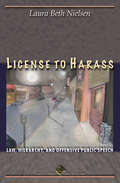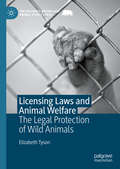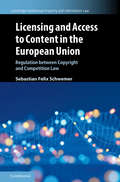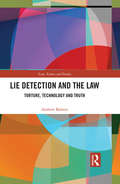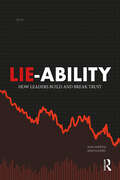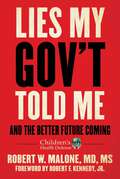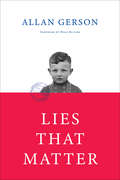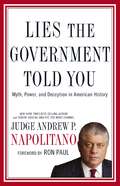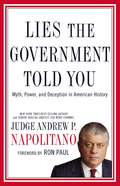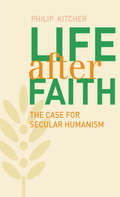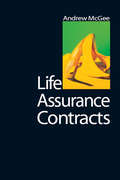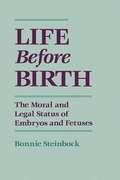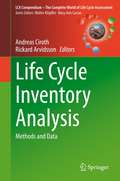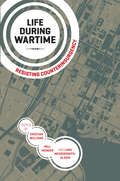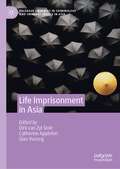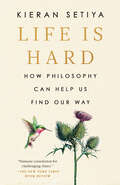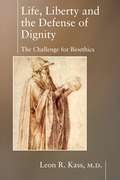- Table View
- List View
License to Harass: Law, Hierarchy, and Offensive Public Speech (The Cultural Lives of Law)
by Laura Beth NielsenOffensive street speech--racist and sexist remarks that can make its targets feel both psychologically and physically threatened--is surprisingly common in our society. Many argue that this speech is so detestable that it should be banned under law. But is this an area covered by the First Amendment right to free speech? Or should it be banned? In this elegantly written book, Laura Beth Nielsen pursues the answers by probing the legal consciousness of ordinary citizens. Using a combination of field observations and in-depth, semistructured interviews, she surveys one hundred men and women, some of whom are routine targets of offensive speech, about how such speech affects their lives. Drawing on these interviews as well as an interdisciplinary body of scholarship, Nielsen argues that racist and sexist speech creates, reproduces, and reinforces existing systems of hierarchy in public places. The law works to normalize and justify offensive public interactions, she concludes, offering, in essence, a "license to harass." Nielsen relates the results of her interviews to statistical surveys that measure the impact of offensive speech on the public. Rather than arguing whether law is the appropriate remedy for offensive speech, she allows that the benefits to democracy, to community, and to society of allowing such speech may very well outweigh the burdens imposed. Nonetheless, these burdens, and the stories of the people who bear them, should not remain invisible and outside the debate.
License to Wed: What Legal Marriage Means to Same-Sex Couples
by Kimberly D. RichmanA critical reader of the history of marriage understands that it is an institution that has always been in flux. It is also a decidedly complicated one, existing simultaneously in the realms of religion, law, and emotion. And yet recent years have seen dramatic and heavily waged battles over the proposition of including same sex couples in marriage. Just what is at stake in these battles?License to Wed examines the meanings of marriage for couples in the two first states to extend that right to same sex couples: California and Massachusetts. The two states provide a compelling contrast: while in California the rights that go with marriage—inheritance, custody, and so forth—were already granted to couples under the state’s domestic partnership law, those in Massachusetts did not have this same set of rights. At the same time, Massachusetts has offered civil marriage consistently since 2004; Californians, on the other hand, have experienced a much more turbulent legal path. And yet, same-sex couples in both states seek to marry for a variety of interacting, overlapping, and evolving reasons that do not vary significantly by location.The evidence shows us that for many of these individuals, access to civil marriage in particular—not domestic partnership alone, no matter how broad—and not a commitment ceremony alone, no matter how emotional—is a home of such personal, civic, political, and instrumental resonance that it is ultimately difficult to disentangle the many meanings of marriage. This book attempts to do so, and in the process reveals just what is at stake for these couples, how access to a legal institution fundamentally alters their consciousness, and what the impact of legal inclusion is for those traditionally excluded.
Licensing Laws and Animal Welfare: The Legal Protection of Wild Animals (The Palgrave Macmillan Animal Ethics Series)
by Elizabeth TysonThis book considers the efficacy of the common regulatory model of the licensing regime as a means of regulating animal use in England, with a particular focus on wild animals and the regime’s ability to ensure animal welfare needs are met. Using information gleaned from over 550 inspection reports relating to the period 2008 through 2019, obtained using FOI Act requests, the book analyses the extent to which animals used by these industries are protected by law. Tyson analyses the limitations present in the practical application of English legislation responsible for creating a number of relevant licensing regimes.The regimes discussed include: The Zoo Licensing Act 1981, the now repealed Welfare of Wild Animals in Travelling Circuses Regulations 2012, and the Animal Welfare (Licensing of Activities Involving Animals) Regulations 2018, introduced under the Animal Welfare Act 2006.Exploring the weakness in the use of this type of regulatory model, Tyson proposes compelling recommendations for change in future policy development. Making an important contribution to the question of enforcement of animal welfare laws, this book provides useful and original insights into the implementation of licensing regimes, and will be of particular interest to scholars of animal welfare law, animal ethics, and critical animal studies.
Licensing and Access to Content in the European Union: Regulation between Copyright and Competition Law (Cambridge Intellectual Property and Information Law #49)
by Sebastian Felix SchwemerCopyright is territorial, but the same cannot be said of the internet, whose borderless nature has changed the way we consume copyright-protected material. Nevertheless, territorial segmentation of online content remains a reality in the 28 member states of the European Union. Licensing and access practices do not reflect this digital reality, in which end-users demand ubiquitous access to content. For this reason, the territorial nature of copyright and traditional business models based on national exploitation prevent the completion of the Digital Single Market. Sebastian Felix Schwemer provides a unique analysis of the dynamic licensing and access arrangements for audiovisual works and music and shows how they are being addressed by sector regulation and competition law in the Digital Single Market. His analysis, which includes case law of the Court of Justice, the Commission's competition proceedings, and various legislative tools, reveals the overlapping nature of legislative and non-legislative regulatory solutions.
Licht – Metapher der Erkenntnis: Das strahlende, blendende und erkennende Licht in der abendländischen Philosophiegeschichte
by Maria NühlenDas Licht als Metapher der Erkenntnis gehört zur abendländischen Tradition der Bildsprache allgemein, insbesondere aber in der Philosophie. Die Erfahrung eines neuen Gedankens, einer neuen Idee oder einer neuen Erkenntnis haben wir, vielleicht mangels eigener sprachlicher Begrifflichkeit, für genau diesen geistigen Vorgang in eine Metapher übertragen, indem wir mit der Vorstellung arbeiten, die sinnliche Wahrnehmung der physischen Erscheinung des Lichts sei vergleichbar mit der geistigen Wahrnehmung eines neuen Gedankens. Durch das Licht sehen wir die Welt und die Dinge in ihr, durch den Geist erkennen wir Weltzusammenhänge, Arten des Seins, Wahrheiten, Kategorien, Strukturen, Hierarchien, was auch immer. Das Hauptanliegen dieses Buches ist es, die Lichtmetapher in ihrer philosophisch-historischen Bedeutung – exemplarisch - aufzuarbeiten, indem es die Philosophiegeschichte nach der Verwendung der Lichtmetapher durchforstet. Wer (1) hat wozu (2) mit welcher philosophischen Aussage (3) die Lichtmetapher benutzt? Das Buch regt so zum Nachdenken über diese Aussagen an und den Diskurs über die Lichtmetapher und die Intelligibilität des Denkens.
Lie Detection and the Law: Torture, Technology and Truth (Law, Science and Society)
by Andrew BalmerThis book develops a sociological account of lie detection practices and uses this to think about lying more generally. Bringing together insights from sociology, social history, socio-legal studies and science and technology studies (STS), it explores how torture and technology have been used to try to discern the truth. It examines a variety of socio-legal practices, including trial by ordeal in Europe, the American criminal jury trial, police interrogations using the polygraph machine, and the post-conviction management of sex offenders in the USA and the UK. Moving across these different contexts, it articulates how uncertainties in the use of lie detection technologies are managed, and the complex roles they play in legal spaces. Alongside this story, the book surveys some of the different ways in which lying is understood in philosophy, law and social order. Lie Detection and the Law will be of interest to STS researchers, socio-legal scholars, criminologists and sociologists, as well as others working at the intersections of law and science.
Lie-Ability: How Leaders Build and Break Trust
by Simon Jones Alan WatkinsBusiness success depends on the ability to build trust. Trusted brands succeed and sustain. Trusted leaders inspire followers, grow companies, revenues and futures. But sadly, deceit has infected business and become widespread. Far too many leaders now use their own "alternative facts", to mislead and misinform their customers, colleagues and communities. The skilfulness and ease with which some leaders now lie has become a Lie-Ability. And when customers stop trusting the products, services or the stories a leader tells, then the business suffers. If business leaders don’t lead a truth renaissance, we are all lost. People no longer trust politicians or the media. And many of the institutions and professions we used to turn to have also lost trust. The only people that can really save us now are business leaders. We need to become truth advocates and activists. We must re-establish a new norm where we tell the truth to ourselves, to our employees, to our shareholders, to our customers and to society at large. This book explores the 7 Deadly Lies that business tells itself, the 7 Dark Arts of Deception that are still used with monotonous regularity to manipulate the narrative. It offers C-suite leaders and senior managers a clear path out of deceit. It provides a solution to the Lie-Ability of some leaders by developing a deeper understanding of truth, how to reclaim it and how to build back trust.
Lies My Gov't Told Me: And the Better Future Coming (Children’s Health Defense)
by Robert W. Malone**AS SEEN ON TUCKER CARLSON TODAY AND THE JOE ROGAN EXPERIENCE**A guide for the times—breaking down the lies about COVID-19 and shedding light on why we came to believe them. When he invented the original mRNA vaccine technology as a medical and graduate student in the late 1980s, Robert Malone could not have imagined that he would become a leader in a movement to expose the dangers of mRNA vaccines that billions of people have received—too often without being informed of the risks. For voicing opposition to the &“mainstream&” narrative, Dr. Robert Malone was censored by Big Tech and vilified by the media. But he continues to speak out and alert the world to the web of lies that we have all experienced. From vaccine safety and effectiveness to early treatments like ivermectin, to lockdowns, masks, and more, Dr. Malone is the signature dissident voice telling the other side of the story about COVID, the role of corporate media, censorship, propaganda, and the brave new world of transhumanism promoted by the World Economic Forum and its acolytes. What effect did the COVID policies have on lives, livelihoods, and democracies? How is it possible that the lies spread by governments would persist, and that our institutions would fail to correct them? Lies My Gov&’t Told Me takes a hard look at these questions and illustrates how data, information, and psychology have been distorted during the pandemic. Governments intentionally weaponized fear to mold behavior. The media smeared anyone who objected to the narrative. And Big Pharma—aligned with larger globalist interests exemplified by the likes of Bill Gates and the World Economic Forum—had captured the agencies that are supposed to regulate it long before the pandemic began. Dr. Malone explores these perverse connections between Pharma, government, and media, and tells us what can be done about it. With contributed chapters from other leading thinkers, such as Dr. Paul Marik and Professor Mattias Desmet, and drawing upon history, psychology, and economics, Lies My Gov&’t Told Me looks at COVID from numerous angles. Never satisfied with a simple answer or easy solution, Dr. Malone proposes multiple action plans for a better future. Dr. Malone calls on each of us to find our own solutions, our own ways to resist the control of fascist, corporatist, and totalitarian overlords. If we are to step out of the darkness—toward a world that defends the principles of the Constitution, upholds individual rights, and honors free speech—we all must play a part in the transition.
Lies That Matter: A federal prosecutor and child of Holocaust survivors, tasked with stripping US citizenship from aged Nazi collaborators, finds himself caught in the middle
by Allan GersonThe true story of a DOJ prosecutor’s complicated quest to deport Nazis: “The lessons that Mr. Gerson learns, and shares, could not be more timely.” —Seth Waxman, former US Solicitor GeneralAs the son of Holocaust survivors, federal prosecutor Allan Gerson thought his professional assignment to investigate and deport those who persecuted his family and others like them would make his parents proud. But their reaction was not what he expected. This is his memoir of the experience—and the complex emotions and questions it provoked.“It takes a young attorney whose Holocaust survivor parents and uncle had to lie in order to gain admittance into the U.S. to recognize the double-edged dangers of pursuing aging Nazi functionaries with the blunt instruments of American immigration law. Can the same laws be turned against his parents and other Jews like them? Allan Gerson tells the gripping story of his two years at the Department of Justice office charged with investigating and deporting aging Nazis living quietly in our midst. His interrogation of suspected perpetrators forces him to uncover secrets of his family and other anguished victims that he never wanted to know . . . This narrative reads like a bildungsroman, a coming of age story of a lawyer who went on to seek American legal remedies for historic crimes and injustices committed elsewhere.” —Samuel Norich, President, The Forward
Lies the Government Told You: Myth, Power, and Deception in American History
by Andrew NapolitanoYOU'VE BEEN LIED TO BY THE GOVERNMENTWe shrug off this fact as an unfortunate reality. America is the land of the free, after all. Does it really matter whether our politicians bend the truth here and there?When the truth is traded for lies, our freedoms are diminished and don't return.In Lies the Government Told You, Judge Andrew P. Napolitano reveals how America's freedom, as guaranteed by the U.S. Constitution, has been forfeited by a government more protective of its own power than its obligations to preserve our individual liberties."Judge Napolitano's tremendous knowledge of American law, history, and politics, as well as his passion for freedom, shines through in Lies the Government Told You, as he details how throughout American history, politicians and government officials have betrayed the ideals of personal liberty and limited government."--Congressman Ron Paul, M.D. (R-TX), from the Foreword
Lies the Government Told You: Myth, Power, and Deception in American History
by Andrew P. NapolitanoCenturies of government deception have suspended our freedom and replaced it with a mythology rich in the ideals we are promised but do not actually experience. The government's lies have become our country's heritage, passed down generationally and accepted over time as status quo. We allow our leaders to regulate, under false pretenses, every area of our supposedly free lives: What we eat, how our money is spent, how we protect ourselves. The basic tenets of living in a free society--the primacy of the individual and limited government-- are violated routinely and with little objection from those most affected. Judge Napolitano traces the deterioration of American freedom year by year, event by event, from the birth of the U.S. government to the economic and military crises of today. He illustrates how this distorted interpretation of government translates to loss for Americans--loss of life, loss of property, loss of freedom. The cost is staggering. Amid the bleak revelation is a call to action. Judge Napolitano offers a blueprint to salvage our freedom and restore the government to its intended role as an instrument to protect the freedoms of the people.
Life After Faith
by Mr Philip KitcherAlthough there is no shortage of recent books arguing against religion, few offer a positive alternative#151;how anyone might live a fulfilling life without the support of religious beliefs. This enlightening book fills the gap. Philip Kitcher constructs an original and persuasive secular perspective, one that answers human needs, recognizes the objectivity of values, and provides for the universal desire for meaningfulness. Kitcher thoughtfully and sensitively considers how secularism can respond to the worries and challenges that all people confront, including the issue of mortality. He investigates how secular lives compare with those of people who adopt religious doctrines as literal truth, as well as those who embrace less literalistic versions of religion. Whereas religious belief has been important in past times, Kitcher concludes that evolution away from religion is now essential. He envisions the successors to religious life, when the senses of identity and community traditionally fostered by religion will instead draw on a broader range of cultural items#151;those provided by poets, filmmakers, musicians, artists, scientists, and others. With clarity and deep insight, Kitcher reveals the power of secular humanism to encourage fulfilling human lives built on ethical truth.
Life Assurance Contracts
by Andrew McGeeLife assurance continues to be a topic of great practical significance, given the popularity of endowment mortgages and pensions, which contain an element of insurance, as well as the need for families to protect against the loss of their breadwinners. Since the first edition of this book in 1995 much has changed, with a fundamentally new regulatory structure under the Financial Services and Markets Act 2000, changes in divorce and bankruptcy law, as well as continued developments in areas such as insurable interest and utmost good faith. All these developments are covered in this new edition, which at the same time retains the extensive coverage of the well-established principles of this area of law. Areas dealt with include insurable interest, disclosure, cancellation, intermediaries, marketing, assignment, surrender and pension policies. This new edition has been comprehensively revised and updated to take account of changes since the last edition was published.
Life Before Birth: The Moral and Legal Status of Embryos and Fetuses (2nd Edition)
by Bonnie SteinbockThis book provides a framework for thinking clearly and coherently about the unborn. The book's thesis, the "interest view," states that all and only beings who have interests have moral standing, and only beings who possess conscious awareness have interests. The chapters apply the interest view, and explore the moral and legal aspects of a wide range of issues.
Life Cycle Inventory Analysis: Methods and Data (LCA Compendium – The Complete World of Life Cycle Assessment)
by Andreas Ciroth Rickard ArvidssonLife Cycle Inventory (LCI) Analysis is the second phase in the Life Cycle Assessment (LCA) framework. Since the first attempts to formalize life cycle assessment in the early 1970, life cycle inventory analysis has been a central part. Chapter 1 “Introduction to Life Cycle Inventory Analysis“ discusses the history of inventory analysis from the 1970s through SETAC and the ISO standard. In Chapter 2 “Principles of Life Cycle Inventory Modeling”, the general principles of setting up an LCI model and LCI analysis are described by introducing the core LCI model and extensions that allow addressing reality better. Chapter 3 “Development of Unit Process Datasets” shows that developing unit processes of high quality and transparency is not a trivial task, but is crucial for high-quality LCA studies. Chapter 4 “Multi-functionality in Life Cycle Inventory Analysis: Approaches and Solutions” describes how multi-functional processes can be identified. In Chapter 5 “Data Quality in Life Cycle Inventories”, the quality of data gathered and used in LCI analysis is discussed. State-of-the-art indicators to assess data quality in LCA are described and the fitness for purpose concept is introduced. Chapter 6 “Life Cycle Inventory Data and Databases“ follows up on the topic of LCI data and provides a state-of-the-art description of LCI databases. It describes differences between foreground and background data, recommendations for starting a database, data exchange and quality assurance concepts for databases, as well as the scientific basis of LCI databases. Chapter 7 “Algorithms of Life Cycle Inventory Analysis“ provides the mathematical models underpinning the LCI. Since Heijungs and Suh (2002), this is the first time that this aspect of LCA has been fundamentally presented. In Chapter 8 “Inventory Indicators in Life Cycle Assessment”, the use of LCI data to create aggregated environmental and resource indicators is described. Such indicators include the cumulative energy demand and various water use indicators. Chapter 9 “The Link Between Life Cycle Inventory Analysis and Life Cycle Impact Assessment” uses four examples to discuss the link between LCI analysis and LCIA. A clear and relevant link between these phases is crucial.
Life During Wartime
by Kristian Williams William Munger Lara Messersmith-Glavin"Together, the writers sound a sobering warning: the American government is an iron fist in a velvet glove whose purpose remains preserving the status quo and enriching the rich."- Publishers WeeklyWhat happens when the techniques of counterinsurgency, developed to squash small skirmishes and guerrilla wars on the border of Empire, blend into the state's apparatus for domestic policing? In Life During Wartime, fifteen authors and activists reflect on the American domestic security apparatus, detailing the increasing militarization of the police force and the re-emergence of infiltration and counter-intelligence as surveillance strategies, highlighting the ways that the techniques and the technologies of counterinsurgency have been applied on the home front, and offering strategies for resistance.Includes contributions Kristian Williams, Will Munger, Walidah Imarisha, George Ciccariello-Maher, Beriah Empie, Elaine Brown, Geoffrey Boyce, Conor Cash, Vicente L. Rafael, Alexander Reid Ross, Evan Tucker, Layne Mullett, Sarah Small, and Luce Guillen-Givins.
Life During Wartime
by Kristian Williams William Munger Lara Messersmith-Glavin"Together, the writers sound a sobering warning: the American government is an iron fist in a velvet glove whose purpose remains preserving the status quo and enriching the rich."- Publishers WeeklyWhat happens when the techniques of counterinsurgency, developed to squash small skirmishes and guerrilla wars on the border of Empire, blend into the state's apparatus for domestic policing? In Life During Wartime, fifteen authors and activists reflect on the American domestic security apparatus, detailing the increasing militarization of the police force and the re-emergence of infiltration and counter-intelligence as surveillance strategies, highlighting the ways that the techniques and the technologies of counterinsurgency have been applied on the home front, and offering strategies for resistance.Includes contributions Kristian Williams, Will Munger, Walidah Imarisha, George Ciccariello-Maher, Beriah Empie, Elaine Brown, Geoffrey Boyce, Conor Cash, Vicente L. Rafael, Alexander Reid Ross, Evan Tucker, Layne Mullett, Sarah Small, and Luce Guillen-Givins.
Life Histories of Genetic Disease: Patterns and Prevention in Postwar Medical Genetics
by Andrew J. HoganA history of genetic testing warns that such tests may tell us more than we want to know.Medical geneticists began mapping the chromosomal infrastructure piece by piece in the 1970s by focusing on what was known about individual genetic disorders. Five decades later, their infrastructure had become an edifice for prevention, allowing today’s expecting parents to choose to test prenatally for hundreds of disease-specific mutations using powerful genetic testing platforms. In Life Histories of Genetic Disease, Andrew J. Hogan explores how various diseases were "made genetic" after 1960, with the long-term aim of treating and curing them using gene therapy. In the process, he explains, these disorders were located in the human genome and became targets for prenatal prevention, while the ongoing promise of gene therapy remained on the distant horizon.In narrating the history of research that contributed to diagnostic genetic medicine, Hogan describes the expanding scope of prenatal diagnosis and prevention. He draws on case studies of Prader-Willi, fragile X, DiGeorge, and velo-cardio-facial syndromes to illustrate that almost all testing in medical genetics is inseparable from the larger—and increasingly "big data"–oriented—aims of biomedical research. Hogan also reveals how contemporary genetic testing infrastructure reflects an intense collaboration among cytogeneticists, molecular biologists, and doctors specializing in human malformation.Hogan critiques the modern ideology of genetic prevention, which suggests that all pregnancies are at risk for genetic disease and should be subject to extensive genomic screening. He examines the dilemmas and ethics of the use of prenatal diagnostic information in an era when medical geneticists and biotechnology companies have begun offering whole genome prenatal screening—essentially searching for any disease-causing mutation. Hogan’s focus and analysis is animated by ongoing scientific and scholarly debates about the extent to which the preventive focus in contemporary medical genetics resembles the aims of earlier eugenicists. Written for historians, sociologists, and anthropologists of science and medicine, as well as bioethics scholars, physicians, geneticists, and families affected by genetic conditions, Life Histories of Genetic Disease is a profound exploration of the scientific culture surrounding malformation and mutation.
Life Histories of Genetic Disease: Patterns and Prevention in Postwar Medical Genetics
by Andrew J. HoganA richly detailed history that “uncovers the challenges and limitations of our increasing reliance on genetic data in medical decision making” (Shobita Parthasarathy, author of Building Genetic Medicine).Medical geneticists began mapping the chromosomal infrastructure piece by piece in the 1970s by focusing on what was known about individual genetic disorders. Five decades later, their infrastructure had become an edifice for prevention, allowing expectant parents to test prenatally for hundreds of disease-specific mutations using powerful genetic testing platforms. In this book, Andrew J. Hogan explores how various diseases were “made genetic” after 1960, with the long-term aim of treating and curing them using gene therapy. In the process, he explains, these disorders were located in the human genome and became targets for prenatal prevention, while the ongoing promise of gene therapy remained on the distant horizon.In narrating the history of research that contributed to diagnostic genetic medicine, Hogan describes the expanding scope of prenatal diagnosis and prevention. He draws on case studies of Prader-Willi, fragile X, DiGeorge, and velo-cardio-facial syndromes to illustrate that almost all testing in medical genetics is inseparable from the larger—and increasingly “big data”–oriented—aims of biomedical research. Hogan also reveals how contemporary genetic testing infrastructure reflects an intense collaboration among cytogeneticists, molecular biologists, and doctors specializing in human malformation.Hogan critiques the modern ideology of genetic prevention, which suggests all pregnancies are at risk for genetic disease and should be subject to extensive genomic screening. He examines the dilemmas and ethics of the use of prenatal diagnostic information in an era when medical geneticists and biotechnology companies offer whole genome prenatal screening—essentially searching for any disease-causing mutation. Hogan’s analysis is animated by ongoing scientific and scholarly debates about the extent to which the preventive focus in contemporary medical genetics resembles the aims of earlier eugenicists. Written for historians, sociologists, and anthropologists of science and medicine, as well as bioethics scholars, physicians, geneticists, and families affected by genetic conditions, Life Histories of Genetic Disease is a profound exploration of the scientific culture surrounding malformation and mutation.
Life Imprisonment in Asia (Palgrave Advances in Criminology and Criminal Justice in Asia)
by Catherine Appleton Dirk van Zyl Smit Giao VucongLife imprisonment is the punishment most often imposed worldwide for what societies regard as the most serious offences. Yet, in Asia the phenomenon has never been studied systematically. Life Imprisonment in Asia fills this major gap. It brings together thirteen new essays on life imprisonment in key jurisdictions in the region. Each chapter consolidates what is known about the law and practice of life imprisonment in the jurisdiction and then explores aspects of the imposition or implementation of life sentences that the authors regard as particularly problematic. In some instances, the main issue is the imposition of life sentences by the courts and their relationship to the death penalty. In others, the focus is on the treatment of life sentenced prisoners. In many instances, the most prominent question is whether life sentenced prisoners should be released and, if so, according to what processes. In the overview chapter, the editors place the complex picture that emerges of life imprisonment in Asia in a global context and point to reforms urgently required to ensure that Asian life sentences meet international human rights standards.Life Imprisonment in Asia should be read by everyone who has an interest in just punishments for serious offences, not only in Asia, but throughout the world. It will be an invaluable tool for lawyers, criminologists, policy makers and penal reform advocates in the region and beyond.
Life Imprisonment: A Global Human Rights Analysis (Oñati International Series In Law And Society Ser.)
by Dirk van Zyl SmitLife imprisonment has replaced the death penalty as the most common sentence imposed for heinous crimes worldwide. Consequently, it has become the leading issue of international criminal justice reform. In the first survey of its kind, Dirk van Zyl Smit and Catherine Appleton argue for a human rights–based reappraisal of this harsh punishment.
Life Is Hard: How Philosophy Can Help Us Find Our Way
by Kieran SetiyaA philosophical guide to facing life&’s inevitable hardships. There is no cure for the human condition: life is hard. But Kieran Setiya believes philosophy can help. He offers us a map for navigating rough terrain, from personal trauma to the injustice and absurdity of the world. In this profound and personal book, Setiya shows how the tools of philosophy can help us find our way. Drawing on ancient and modern philosophy as well as fiction, history, memoir, film, comedy, social science, and stories from Setiya&’s own experience, Life Is Hard is a book for this moment—a work of solace and compassion.Warm, accessible, and good-humored, this book is about making the best of a bad lot. It offers guidance for coping with pain and making new friends, for grieving the lost and failing with grace, for confronting injustice and searching for meaning in life. Countering pop psychologists and online influencers who admonish us to &“find our bliss&” and &“live our best lives,&” Setiya acknowledges that the best is often out of reach. Instead, he asks how we can weather life&’s adversities, finding hope and living well when life is hard.
Life Is Short: An Appropriately Brief Guide to Making It More Meaningful
by Dean RicklesWhy life’s shortness—more than anything else—is what makes it meaningfulDeath might seem to render pointless all our attempts to create a meaningful life. Doesn’t meaning require transcending death through an afterlife or in some other way? On the contrary, Dean Rickles argues, life without death would be like playing tennis without a net. Only constraints—and death is the ultimate constraint—make our actions meaningful. In Life Is Short, Rickles explains why the finiteness and shortness of life is the essence of its meaning—and how this insight is the key to making the most of the time we do have.Life Is Short explores how death limits our options and forces us to make choices that forge a life and give the world meaning. But people often live in a state of indecision, in a misguided attempt to keep their options open. This provisional way of living—always looking elsewhere, to the future, to other people, to other ways of being, and never committing to what one has or, alternatively, putting in the time and energy to achieve what one wants—is a big mistake, and Life Is Short tells readers how to avoid this trap.By reminding us how extraordinary it is that we have any time to live at all, Life Is Short challenges us to rethink what gives life meaning and how to make the most of it.
Life Lessons for Lawyers: Guidance for the Mind and Soul
by Ray SteinwallThis book draws on the author’s professional experience and published works in the areas of leadership, philosophy, psychology and management (amongst others) to discuss the ‘softer’ qualities of being a good lawyer – qualities which are not taught or widely documented, such as humility, confidence, personal relationships and our dreams and vision.The book demonstrates that we can be individuals within the law and outlines qualities that can both enrich our work and our souls. A theme throughout many of the chapters is to encourage us to think and act differently to what we may have been taught, what others expect or what we ourselves believe. To know that regardless of our strengths and weaknesses, we are unique individuals in the law. This book offers wisdom and pragmatic support for lawyers and anyone involved with the law.Covering a range of issues, it includes advice on: • Maintaining one’s passions inside and outside law • Dealing with perfectionist tendencies, anxiety and depression • Manging our fears and dealing with mistakes • Striving for an honourable path • Understanding and leveraging the organisational matrix • Acting as a moral voice in your organisation • Leading with humility and vulnerability • Taking breaks and reconnecting with ourselves • Navigating structural inequalities in one’s career.This book is an easy must-read for anyone seeking advice on how to succeed in law.
Life Liberty & the Defense of Dignity
by Leon KassAt the onset of Life, Liberty and the Defense of Dignity, Leon Kass gives us a status report on where we stand today: "Human nature itself lies on the operating table, ready for alteration, for eugenic and psychic 'enhancement,' for wholesale redesign. In leading laboratories, academic and industrial, new creators are confidently amassing their powers and quietly honing their skills. For anyone who cares about preserving our humanity, the time has come for paying attention." Trained as a medical doctor and biochemist, Dr. Kass has become one of our most provocative thinkers on bioethical issues. In Life, Liberty and the Defense of Dignity, he has written a book that grapples with the moral meaning of the new biomedical technologies now threatening to take us back to the future envisioned by Aldous Huxley in Brave New World. In a series of mediations on cloning, embryo research, the sale of organs, and the assault on mortality itself, Kass questions the wisdom of trying to break down the natural boundaries given us and to remake the human body into an instrument of our will. He also attempts to chart a course by which we might avoid the dehumanization of biotechnical "recreationism" without rejecting modern science or rejecting its genuine contributions to human welfare. Leon Kass writes profoundly about the limits of science and the limits of life, about what makes us human and gives us human dignity. Life, Liberty and the Defense of Dignity.
